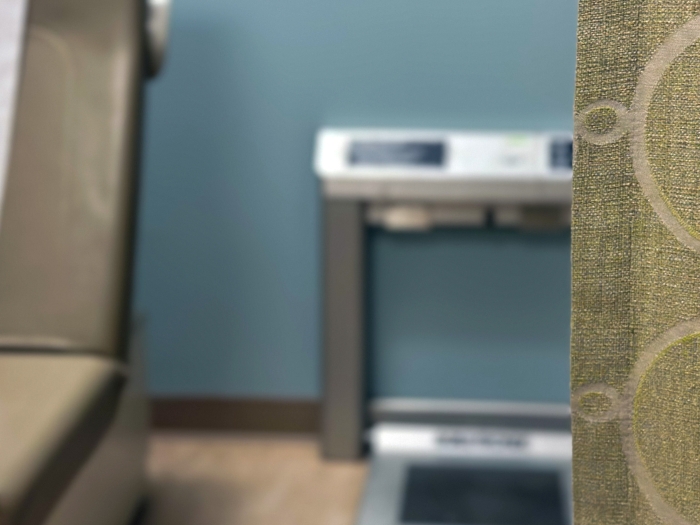Nearly 1 in 5 patients with a lap band undergoes multiple device-related reoperations, and complication rates range widely among hospitals, new research finds.
1:00 PM
Author |

Every year, nearly 200,000 Americans turn to surgeons for help with their obesity, seeking bariatric surgery to lose weight and prevent life-threatening health problems.
MORE FROM THE LAB: Subscribe to our weekly newsletter
But after more than two decades of steadily increasing numbers of operations, American bariatric surgery centers still vary greatly in the quality of care they provide.
That's the finding of a team of researchers at the University of Michigan who used data from insurers that pay for bariatric operations, and from a statewide partnership of bariatric surgery teams, to study bariatric surgery outcomes.
In the past few months, the U-M team has published several papers that shed new light on the high level of variability and incidence of complications that patients still face.
"As Americans turn to bariatric and metabolic operations in higher and higher numbers, and as our county grapples with the ongoing obesity epidemic, it's more important than ever to take a clear-eyed look at how well our surgical centers are doing and to try to improve the care patients receive," says Andrew M. Ibrahim, M.D., M.Sc., the Robert Wood Johnson Clinical Scholar and U-M surgical resident who led many of the new studies as part of his work at the U-M Center for Healthcare Outcomes and Policy.
The team's most recent findings:
Reoperation
In a seven-year study, nearly 1 in 5 patients with Medicare who had laparoscopic adjustable gastric band surgery had at least one more device-related operation, either to remove or replace the band around the upper portion of their stomach or to switch to a different stomach-remodeling approach. The results were published in JAMA Surgery.
Additional device-related procedures for the operation were so common that nearly half (47 percent) of the $470 million Medicare paid throughout the study period for such procedures was for reoperations. "If half the money we're spending on a device is to revise or remove it, we ought to ask ourselves if we should still be using it," says Ibrahim.
Though this form of bariatric surgery has declined sharply in popularity in recent years, now making up about 5 percent of operations, there are hundreds of thousands of people who have the devices from past procedures. Failure of the devices to result in weight loss and complications from their placement both pose potential major issues. The study finds tremendous variation between surgical centers in the rate of reoperation.
The study looked at data from 25,042 people who had operations between 2006 and 2013 and who were covered by Medicare, which pays for about 15 percent of all bariatric operations.
Varying complication rates
Another recent paper from the U-M team found that even accredited bariatric "centers of excellence" can vary greatly in the rate of complications their patients suffer after their operations.
SEE ALSO: Opinion: Lack of Access to Obesity Care Highlights Stigma and Disparity
Published in JAMA Surgery, the study looked at data from more than 145,500 patients and found a 17-fold difference between the centers with the highest and lowest rates of serious complications. It found that even within a state, one bariatric surgery center can have nine times the complication rate of another center.
"While we have made significant progress improving the safety of bariatric surgery over the last two decades, the presence of 17-fold variation in complications rates across accredited centers underscores that we need to improve further," Ibrahim notes.
Quality vs. cost of care
The team also recently studied how variations in quality affect the cost of care, which ultimately affects both the premiums paid by those with private insurance and public costs for the care of people who have operations paid for by Medicare and Medicaid.
The researchers looked at data from 38,374 patients covered by Medicare for bariatric surgery between 2011 and 2013 and found that hospitals with the lowest complication rates perform bariatric procedures for $1,321 less per patient than hospitals with the highest complication rates. When they focused on patients with additional risk factors that made them more prone to surgical complications, that difference grew to more than $2,100 per patient.
So, the researchers conclude in Annals of Surgery, efforts to improve bariatric surgery quality could significantly affect not only patients, but also the cost of care.
Ibrahim and colleagues, including Center for Healthcare Outcomes and Policy Director Justin Dimick, M.D., M.P.H., and Amir Ghaferi, M.D., M.S., who heads the Michigan Bariatric Surgery Collaborative, continue to study bariatric surgical care nationwide and to help Michigan's bariatric surgery teams improve the care they provide.

Explore a variety of healthcare news & stories by visiting the Health Lab home page for more articles.

Department of Communication at Michigan Medicine
Want top health & research news weekly? Sign up for Health Lab’s newsletters today!





